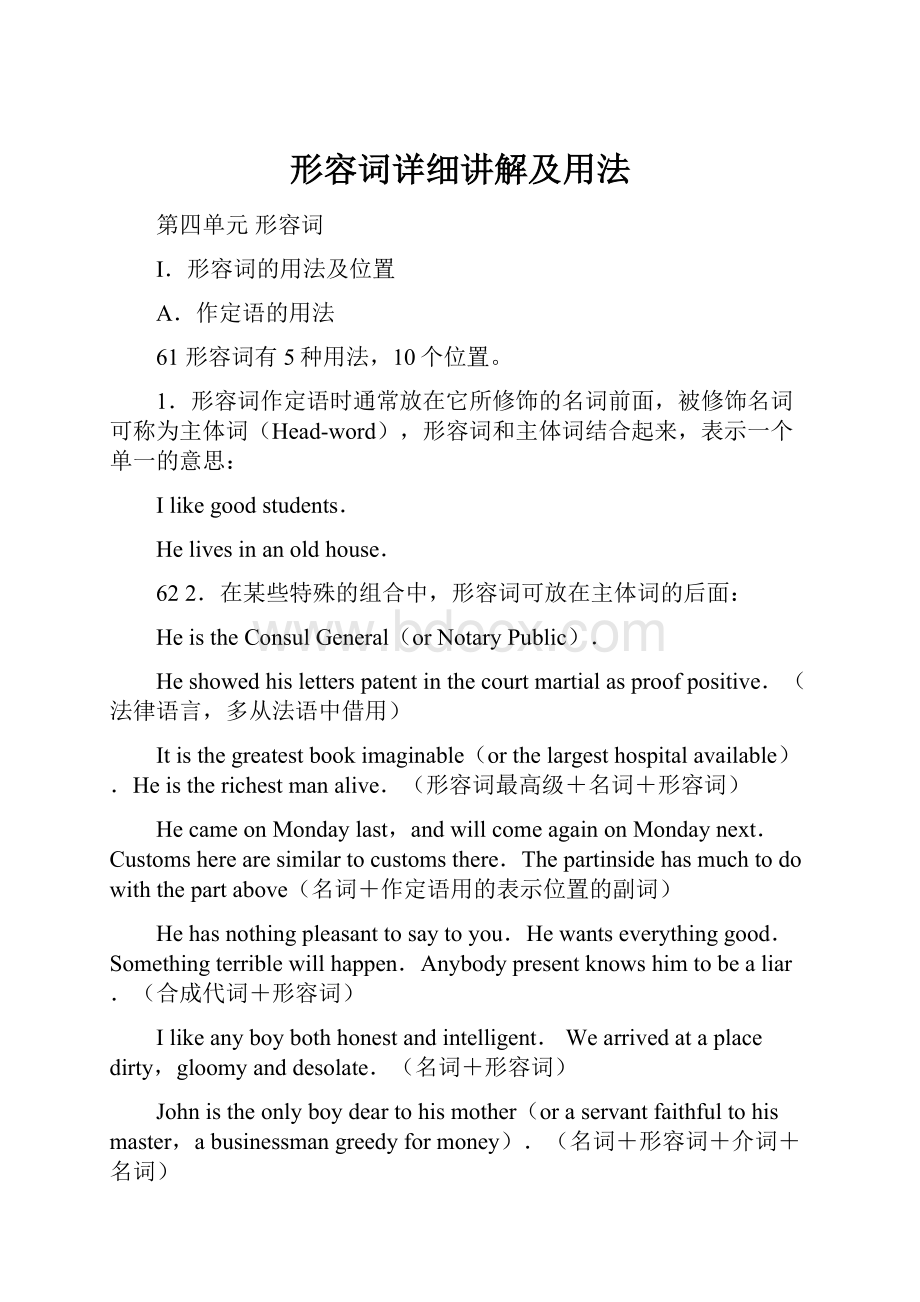形容词详细讲解及用法.docx
《形容词详细讲解及用法.docx》由会员分享,可在线阅读,更多相关《形容词详细讲解及用法.docx(44页珍藏版)》请在冰豆网上搜索。

形容词详细讲解及用法
第四单元形容词
Ⅰ.形容词的用法及位置
A.作定语的用法
61形容词有5种用法,10个位置。
1.形容词作定语时通常放在它所修饰的名词前面,被修饰名词可称为主体词(Head-word),形容词和主体词结合起来,表示一个单一的意思:
Ilikegoodstudents.
Helivesinanoldhouse.
622.在某些特殊的组合中,形容词可放在主体词的后面:
HeistheConsulGeneral(orNotaryPublic).
Heshowedhisletterspatentinthecourtmartialasproofpositive.(法律语言,多从法语中借用)
Itisthegreatestbookimaginable(orthelargesthospitalavailable).Heistherichestmanalive.(形容词最高级+名词+形容词)
HecameonMondaylast,andwillcomeagainonMondaynext.Customsherearesimilartocustomsthere.Thepartinsidehasmuchtodowiththepartabove(名词+作定语用的表示位置的副词)
Hehasnothingpleasanttosaytoyou.Hewantseverythinggood.Somethingterriblewillhappen.Anybodypresentknowshimtobealiar.(合成代词+形容词)
Ilikeanyboybothhonestandintelligent.Wearrivedataplacedirty,gloomyanddesolate.(名词+形容词)
Johnistheonlyboydeartohismother(oraservantfaithfultohismaster,abusinessmangreedyformoney).(名词+形容词+介词+名词)
HewasAlexandertheGreat(orRichardtheLion-Hearted).(专有名词+the+形容词)
Marriageisamatterhardtohandle.Iknowofamanreadytohelpus.Isthisthetimesuitabletosayanything?
(名词+形容词+不定式)
Hedrovealongapathtwometerswide.Helivesinahouseeightstorieshigh.Aboyaboutfiveyearsoldisplayinginthegarden.(名词+数词+名词+形容词)
Heisaboytallerthanyou(orastallasyou).(名词+形容词比较级+than+名词)或(名词+as+形容词+as+名词)
Theresleptamanwithhiseyesopen.Lookatthedogwithitsearserect.(with+名词+形容词)
B.作补语(表语)的用法
633.和名词一样,形容词也可用在系动词后作补语(表语),修饰主语或说明主语的情况:
Youarehungry.Johnishonest.Fatherseemssad.Marylooksold.Ifeeltired.Leeremainsill.Sheisgrowingfat.
如果形容词需要强调而主语又有较长的修饰语,形容词可放在系动词及主语的前面:
Gonearethedayswhenmyheartwasyoungandgay.
Happyishewhoissatisfiedwithwhathehas.
如形容词前还有how修饰,也可放在前面:
Howoldishe?
(疑问句)
Howstrongishiscountry?
Howfunnyheis!
(Not:
ishe?
)(感叹句)
Howrichthiscountryis!
644.和名词一样,形容词也可用在宾补动词后作宾语的补语,对宾语加以修饰或说明:
Theymakemeangry.Ithoughtiteasy.Helikeshiscoffeehot.Theylefttheirsonignorant.Theycalledhisworksgreat.Motherkeepsthefloorclean.TheyfindJohnhon-est.
如果宾语很长,形容词也可放在动词后面(紧跟动词):
Motherkeepscleanthefloor,thefurnitureandeverything.
Hesetfreealltheprisonersinthevillage.
Heleftvacantalltheroomsofhishotel.
C.解释性用法
655.有些形容词,常和别的词结合,对主语进行解释,它和主语间常用逗号隔开(这时它带有状语的作用,说明为什么有这种情况):
Sadandtired,Johnwanderedabout.(=Johnwassadandtired,andthushewanderedabout.)
Young,richandpretty.Maryhasmanyboyfriends.(=Maryisyoung,richandpretty.andsoshehasmanyboyfriends.)
Angrywithme,hecomplainedallday.
Ashamedofhisuncle,Johnrefusedtomentionhim.
Unabletoreply,shepretendednottohearme.
Readytofightthem,hestoodunmoved.
Threehundredmileslong,theroadisthelongestoneinthiscountry.(=Theroadisthreehundredmileslong,anditisthelongestoneinthiscountry.)
Ninetyyearsold,grandmaisstillhealthy.(=Grandmaisninetyyearsold,yetsheisstillhealthy.)
Penniless(usedsingly),hesoldhiswatch.
666.解释性的形容词,也可放在主语后面,这时强调性较弱,它前后都有逗号把它和句子的其他部分隔开:
John,sadandtired,wanderedabout.
Mary,young,rich,andpretty,hasmanyboyfriends.
Theroad,threehundredmileslong,isthelongestinthecountry.
677.这种形容词放在句末时强调性最强,这时句子的谓语大多为不及物动词,表示一个动作。
如果句子短,前面可以不加逗号:
Johnwanderedaboutsadandtired.(=Johnwanderedabout,andwassadandtired.)
Heapproached,carelessofdanger.
Hestruggledandstruggled,unabletogetup.
Johnfelldownunconscious.
Hesattheresilentandsad.
688.解释性形容词一般对主语进行解释,偶尔也用来说明宾语:
Heplacedme,dirtyanddamp,besidetheking.
TheytookJohn,halfdead,tothehospital.
D.作独立成分
699.形容词可用在句首,起独立成分的作用,和句子的任何其他词都没有联系,只对整个句子作某种说明,多和一些其他词结合使用,单独用时较少:
First,weneedmoney;second,weneedcourage.
True,hehasmarriedtwice.
Hehasnojob.Worse,heisill.
Sadtosay,Icannottrustawomananymore.
Needlesstosay,heistheworstmaninthiscity.
Curioustorelate,shelovesapoormanlikeme.
Contrarytothepopularopinion,averystrongmanoftendiesyoung.
Mostwonderfulofall,hebegantorepent.
Mostimportantofall,oneshouldknowoneself.
Bestofall,heisextremelypatient.
E.作感叹语
7010.形容词有时用作感叹语,表示一时的情绪:
Stupid!
Hemustbecrazy.
Verygood!
Doitagain.
Right!
Sowhatiswrong?
Wonderful!
Wonderful!
Shocking!
Ihaveneverseensuchathing.
Howdangerous!
F.只作表语和只作定语
71有些形容词只能用作表语,不能在名词前作定语,这类形容词可称为表语形容词,如:
ill,well,content,unable,sorry,glad,mindful,exempt,bound(for),bent(on),afraid,ashamed,asleep,awake,away,aware,alike,alive,alert,averse,agape,astir,ablame,afloat,afire(还有其他以a-开始的词)。
正确用法:
Heisalone.
Isawhimalone.
Theoldman,aloneontheisland,lookedlikeabeast.
Aloneontheisland,theoldmanlookedlikeabeast.
Hewanderedaboutsadandalone.
错句:
Heisanaloneman.(应用lonely或lonesome)
Thealonewomanhaslivedheremanyyears.(lonely)若在名词前作定语,可改用其他形容词,如可以用sick代替ill,以happy代替glad,frightened代替afraid,以contended代替content。
有个别这类词可作定语,但意思有变化,如:
whatasorry(可悲的)situation!
Thisisaglad(令人高兴的)dayforus.
72另一方面,有些形容词只能用作定语,不能用作表语,如:
left,right,inner,outer,upper,hinder,utter,former,elder,eldest,major,minor,latter,lesser,wooden,earthen,woolen,brazen,golden,ashen,leaden,flaxen
Hiselderbrotherisfifteen.(正确)
Hisbrotheriselder.(错误)
Hislefthandiswounded.(正确)
Hiswoundedhandisleft.(错误)
Hehasawoodenhouse.(正确)
Hishouseiswooden.(错误)
Thefigureisgolden.(错误)
Thepotisearthen.(错误)
但在用于引伸意义时,有些这类形容词可以这样用,如:
Hisfuturelooksgolden.(正确)
Hisfaceisashen.(正确)
Ⅱ.两类形容词
A.描绘性形容词
73从实用角度考虑,形容词可以分为描绘性和限定性两大类。
1.绝大多数形容词都是描绘性的,前节所列形容词都属于这一类。
它们可能表示有关人的品质,如Shakespearean,Dar-winian,Marxian,Herculean,也表示某些东西的特点,如Biblical,solar,celestial,可与地名有关,如Japanese,Ro-man,Parisian,也可与某种材料有关,如brazen,airy,earthen,可指外观,如long,colorful,square,也可指性质,如strong,harmful,lasting,或指情绪,如angry,sad,charmed等等。
2.它们可以放在多种位置:
a)名词前面,b)名词后面,c)系动词后面作补语,d)宾语后面作宾语的补语及前章所列的其他6个位置,如:
a)Agooddictionaryisnecessary.
b)Adictionarygoodforchildrenisnecessary.
c)Thisdictionaryisgood.
d)Hefindsthedictionarygood.
3.它们大多数可用于比较级,如:
strong,stronger,strongest;long,longer,longest;beautiful,morebeautiful,mostbeautiful;depressing,moredepressing,mostdepressing
4.它们多数都不能用作名词或代词,除非加上某种词尾,如:
形容词——happy,honest,long,strong,sad,hungry,poor
名词——happiness,honesty,length,strength,sadness,hunger,poverty
有少数形容词可以用作名词:
Heisagood(形容词)man.
Heneverdoesgood(名词).
Helivesanevil(形容词)life.
Hereturnsgoodforevil(名词).
Healwaysgoestheright(形容词)way.
Hedoesnotknowthedifferencebetweenright(名词)andwrong.
Helivesinaverydark(形容词)room.
Henevergoesoutafterdark(名词).
Hefeltcold(形容词).
Heshiveredwithcold(名词).
5.描绘性形容词都放在限定性形容词后面,用来修饰同一名词,如allrichmen,anyreddress
6.它们对名词的单复数问题不产生影响,如fatboys,wiseboys,kind-heartedboys
B.限定性形容词
74另一类称为限定性形容词。
1.这类形容词数量不多,仅仅有几十个。
但它们用得很多,也很重要。
它们可以表示数量,如much,little,也可表示数目,如many,numerous,few,five.最重要的是,它们可以表示“哪个?
”,如:
this,that,all,any,some,every,either,both,the,a,这些也可称为指不词(demonstratives)。
2.它们只能用在名词前面,不能用于其他位置,如:
Somedictionariesareveryuseful.
Hehasacar.
Johnhasnochildren.
Youmayaskmeanyquestion.
但有少数例外情况,例如有些可作表语或补语:
Hisfaultsareveryfew,andmineareverymany.Hismoneyistoomuch,andmineistoolittle.Heisfifteen.
有少数这类词常可用作补语,但这时它们是代词而不是形容词,如:
Thatisall中的all,Myadviceisthis中的this以及Suchismypurpose中的such。
3.这类形容词一般不能用于比较级,只有少数表示数量的形容词可有比较级和最高级,如:
many(ormuch),more,most;few,fewer,fewest;little,less,least
4.它们大多可以用作代词或名词,只有少数除外(如:
no,a,the,every):
Muchhasbeensaid.
Sevenwerekilled.
John'sisbetterthanmine(不能用my).
Mineistheredone.
Bothofthemareill.
Don'tsaythat.
5.如果和描绘性形容词同时用来修饰一个名词,它们都放在描绘性形容词前面:
Hehasmanygoodfriends.(不能说goodmanyfriends)
Heknowssomesuchhonestnorthernpeople.(不能说honestnorthernsomesuchpeople)
6.它们决定后面所修饰名词的单复数。
这个问题下节将详细讨论。
Ⅲ.限定性形容词与名词单复数的关系
75限定性形容词,或称限定词(Determinatives),对它所修饰的名词(主体词)起某种限定的作用,即决定在3种情况中属于哪一种:
a)可数名词——单数,b)可数名词——复数,还是c)不可数名词。
换句话说,它必须与主体词在是否可数,及是单数还是复数上一致。
某一特定的限定词,其主体词只能是单数可数名词,如thisbook;另一限定词只能和一复数可数名词一起用,如thesebooks;再一种限定词只能用来修饰不可数名词,如muchink.第四种可以和任何名词连用,如somebook,somebooks,someink.
76有些词组起着限定词的作用,如:
anumberof,lotsof,agreatdealof,它们和单一的形容词作用一样。
例如在anumberofstudents中,anumberof修饰名词(主体词)students,意思接近some。
如果机械地把number看作主体词,把ofstudents看作定语,就会理解错误。
771.下面这些单数可数限定词或限定词型的短语(简称SCD)a,one,each,every,either,neither,sucha,manya,another,acertain,asingleorhalfa都只能用在单数可数名词(简称SCN)前面。
简言之,SCD用在SCN前面:
[S=singular,C=countable,D=determinative,N=noun]
Hehasacar.(正确)
Hehasacars.(错误)
Hehasamoney.(错误)
Acertaingentlemancame.(正确)
Acertaingentlemencame.(错误)
Hehasnotasingleink.(错误)
Ihaveneverseensuchananimal.(正确)
Ihaveneverseensuchananimals.(错误)
Suchawaterisnotgoodforus.(错误)
782.单数可数限定词(简称SCD)或不可数限定词(简称UD)或起同样作用的短语,如:
this,that,akind(orsort,type,class,form,make,style,brand,breed,species)of可用在单数可数名词(SCN)或不可数名词(UN)前面。
简言之,SCD,UD用在SCN,UN前面。
[U=un-countable]
Thisbookisenjoyable.
Thisweatherisenjoyable.
Thisbooksareenjoyable.(错误)
Thatcarismine.
Thatmilkissour.
Thatcarsaremine.(错误)
Thisisakindofbat.
Thereisasortofgascalledoxygen.
APekineseisaspeciesofdogs.(少见)
793.通用限定词(简称GD)或类似短语the,some,any,no,what,his(orJohn's,etc.),thesame,thevery,allthe,part(orhalf,most)manykinds(orsorts,types,etc.)of等,可用在任何名词的单数或复数(简称为GN)前面。
简言之,GD用在GN前面。
[G=general]
Hehasnocar.
Hehasnocars.
Hehasnomoneyandnohumour.
Thesamegentlemancame.
Thesamegentlemencame.
Hehasnotthesameambitionasyouhave.
Whathousedoyouwant?
Whathousesdoyouwant?
Whatbreaddoyouwant?
Whateducationdoyouwant?
804.不可数限定词(简称UD)或类似短语much,little,alit-tle,notalittle,agood(orgreat)dealof,alarge(orsmall)amountof,abitof,atouchof,atraceof等,可用在不可数名词(简称UN)前面。
简言之,UD用在UN前面。
[P=plural]
Hehasalittlemoneyandalittlehumour.